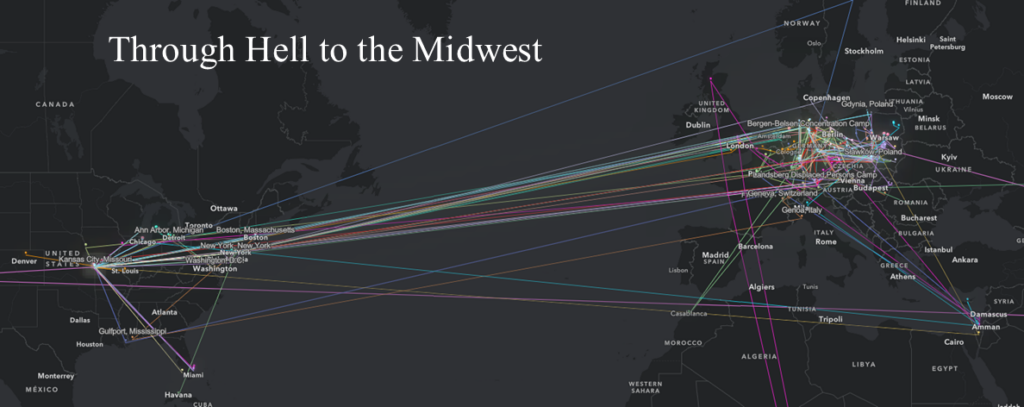The Midwest Center for Holocaust Education teaches the history of the Holocaust, applying its lessons to counter indifference, intolerance, and genocide.
What types of resistance among Christian groups occurred during the Third Reich? In this presentation, we will explore the various ways both Protestants and Catholics expressed their opposition to Nazi policies, ranging from writing letters of complaint to government officials, to groups working to replace Hitler’s regime. Ultimately, none of these resistance actions stopped the Nazi regime, only the Allied Powers winning the war stopped Hitler. However, the actions taken by some have left a strong moral legacy reminding us that we must not be silent in the face of evil.
This program is presented by Dr. Beth Greich-Pollele, Kurt Mayer Chair in Holocaust Studies at Pacific Lutheran University. The event is co-sponsored by Rockhurst University and made possible with the support of the Jean G. Zeldin Partners in Holocaust Education Fund at the Midwest Center for Holocaust Education.
The true account of Enric Marco, the longstanding self-elected speaker of the Spanish Association for Holocaust Victims. Enric falsely claimed to have been one of 9,000 Spaniards interned in a Nazi concentration camp.
The public is invited to view the film and listen to remarks from Benito Bermejo, the Spanish historian whose work exposed Marco’s lies.
This program is offered in partnership with UMKC School of Humanities and Social Sciences, the Oppenstein Brother’s Fund for Judaic Studies, the Midwest Center for Holocaust Education, and Sister Cities Association of Kansas.
Free and open to the public
MCHE supports the freedom to read. Our second annual banned/challenged books give away encourages the free exchange of ideas, open access to published materials, and civil discussion of conflicting points-of-view – drawing on the lessons of the Holocaust.
Policing the People: Incarcerating Dissent and Difference
Once in power, the Nazi government began a swift process of dismantling German democracy from the inside out. In order to effectuate this transformation they relied on a program of intimidation and state sanctioned terror. This five-week course taught by MCHE historian Dr. Shelly Cline, takes an in-depth look at a few of the most critical groups that Nazi control possible.
This program is offered both in-person and on Zoom and requires payment of a $60 registration fee below. The in-person program meets for 5 weeks on Thursdays beginning on October 16 at 12:oo pm at the Jewish Community Campus. The Zoom program meets on Fridays beginning on October 17 at 12:00 pm.
Program via webinar on Thursday, October 9 at 6:30 p.m.
Eric Marcus, founder and host of the award-winning Making Gay History podcast discusses the experiences of LGBTQ people during the rise of the Nazi regime, World War II, and the Holocaust. Drawing on extensive research conducted for this first-of-its-kind audio documentary, Eric will share clips from archival interviews that bring this painful, often hidden history to life through the voices of the people who lived it.
Once in power, the Nazi government not only transformed the German state from a democracy to a dictatorship, they also took control of cultural institutions and began to dictate art and artistic expression. This control took the form of promoting Nazi sanctioned German art as well as condemning, seizing, and in some cases destroying existing art they considered to be un-German. This presentation examines the art they attacked, the methods they used, and the lessons we can learn from this authoritarian destruction of culture.
A presentation by Dr. Shelly Cline, Historian and Director of Education at the Midwest Center for Holocaust Education.
“Through Hell to the Midwest” is a mapping project that traces the stories of survivors who settled in the Kansas City area. Using oral history testimony collected by the Midwest Center for Holocaust Education and dually housed in the Fortunoff Archive at Yale University. Dr. Amber Nickell, Professor Hollie Marquess, and student Sarah Keiss from the Fort Hays State University History Department have mapped these survivors and their experiences. Each map tells the story of one Holocaust survivor, tracing their steps from their hometowns in Central and Eastern Europe, through their Holocaust experiences to their new lives in Kansas and Missouri.

Support our mission to teach the history of the Holocaust, applying its lessons to counter indifference, intolerance, and genocide.
Learn MoreOur mission is to teach the history of the Holocaust, applying its lessons to counter indifference, intolerance, and genocide.
Consider making a gift today.